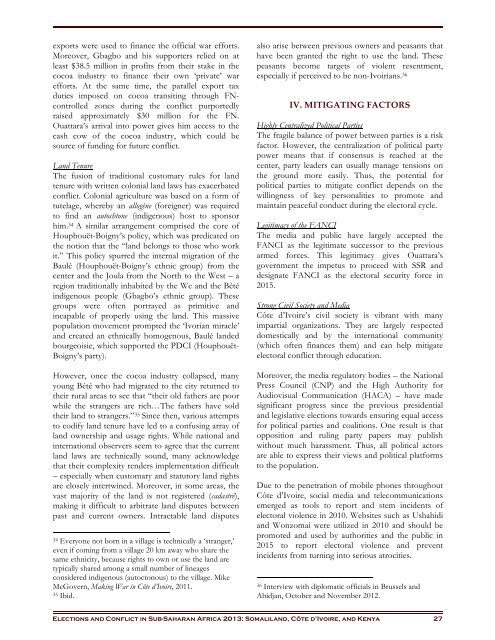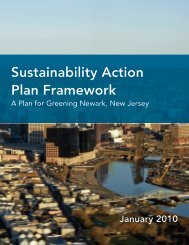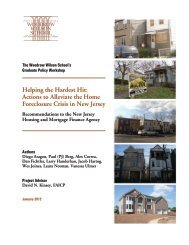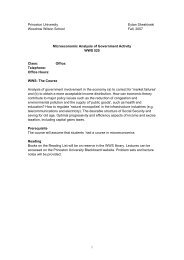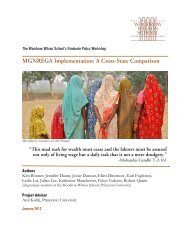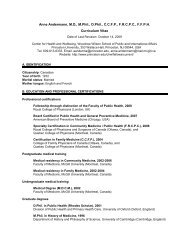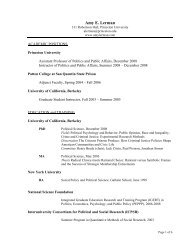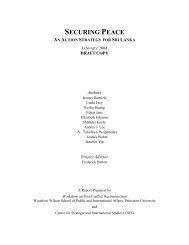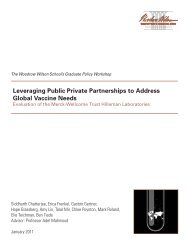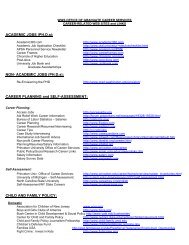Elections and Conflict in Sub-Saharan Africa 2013 - Woodrow ...
Elections and Conflict in Sub-Saharan Africa 2013 - Woodrow ...
Elections and Conflict in Sub-Saharan Africa 2013 - Woodrow ...
Create successful ePaper yourself
Turn your PDF publications into a flip-book with our unique Google optimized e-Paper software.
exports were used to f<strong>in</strong>ance the official war efforts.Moreover, Gbagbo <strong>and</strong> his supporters relied on atleast $38.5 million <strong>in</strong> profits from their stake <strong>in</strong> thecocoa <strong>in</strong>dustry to f<strong>in</strong>ance their own ‘private’ warefforts. At the same time, the parallel export taxduties imposed on cocoa transit<strong>in</strong>g through FNcontrolledzones dur<strong>in</strong>g the conflict purportedlyraised approximately $30 million for the FN.Ouattara’s arrival <strong>in</strong>to power gives him access to thecash cow of the cocoa <strong>in</strong>dustry, which could besource of fund<strong>in</strong>g for future conflict.L<strong>and</strong> TenureThe fusion of traditional customary rules for l<strong>and</strong>tenure with written colonial l<strong>and</strong> laws has exacerbatedconflict. Colonial agriculture was based on a form oftutelage, whereby an allogène (foreigner) was requiredto f<strong>in</strong>d an autochtone (<strong>in</strong>digenous) host to sponsorhim. 34 A similar arrangement comprised the core ofHouphouët-Boigny’s policy, which was predicated onthe notion that the “l<strong>and</strong> belongs to those who workit.” This policy spurred the <strong>in</strong>ternal migration of theBaulé (Houphouët-Boigny’s ethnic group) from thecenter <strong>and</strong> the Joula from the North to the West – aregion traditionally <strong>in</strong>habited by the We <strong>and</strong> the Bété<strong>in</strong>digenous people (Gbagbo’s ethnic group). Thesegroups were often portrayed as primitive <strong>and</strong><strong>in</strong>capable of properly us<strong>in</strong>g the l<strong>and</strong>. This massivepopulation movement prompted the ‘Ivorian miracle’<strong>and</strong> created an ethnically homogenous, Baulé l<strong>and</strong>edbourgeoisie, which supported the PDCI (Houphouët-Boigny’s party).However, once the cocoa <strong>in</strong>dustry collapsed, manyyoung Bété who had migrated to the city returned totheir rural areas to see that “their old fathers are poorwhile the strangers are rich…The fathers have soldtheir l<strong>and</strong> to strangers.” 35 S<strong>in</strong>ce then, various attemptsto codify l<strong>and</strong> tenure have led to a confus<strong>in</strong>g array ofl<strong>and</strong> ownership <strong>and</strong> usage rights. While national <strong>and</strong><strong>in</strong>ternational observers seem to agree that the currentl<strong>and</strong> laws are technically sound, many acknowledgethat their complexity renders implementation difficult– especially when customary <strong>and</strong> statutory l<strong>and</strong> rightsare closely <strong>in</strong>tertw<strong>in</strong>ed. Moreover, <strong>in</strong> some areas, thevast majority of the l<strong>and</strong> is not registered (cadastré),mak<strong>in</strong>g it difficult to arbitrate l<strong>and</strong> disputes betweenpast <strong>and</strong> current owners. Intractable l<strong>and</strong> disputes34 Everyone not born <strong>in</strong> a village is technically a ‘stranger,’even if com<strong>in</strong>g from a village 20 km away who share thesame ethnicity, because rights to own or use the l<strong>and</strong> aretypically shared among a small number of l<strong>in</strong>eagesconsidered <strong>in</strong>digenous (autoctonous) to the village. MikeMcGovern, Mak<strong>in</strong>g War <strong>in</strong> Côte d’Ivoire, 2011.35 Ibid.also arise between previous owners <strong>and</strong> peasants thathave been granted the right to use the l<strong>and</strong>. Thesepeasants become targets of violent resentment,especially if perceived to be non-Ivoirians. 36IV. MITIGATING FACTORSHighly Centralized Political PartiesThe fragile balance of power between parties is a riskfactor. However, the centralization of political partypower means that if consensus is reached at thecenter, party leaders can usually manage tensions onthe ground more easily. Thus, the potential forpolitical parties to mitigate conflict depends on thewill<strong>in</strong>gness of key personalities to promote <strong>and</strong>ma<strong>in</strong>ta<strong>in</strong> peaceful conduct dur<strong>in</strong>g the electoral cycle.Legitimacy of the FANCIThe media <strong>and</strong> public have largely accepted theFANCI as the legitimate successor to the previousarmed forces. This legitimacy gives Ouattara’sgovernment the impetus to proceed with SSR <strong>and</strong>designate FANCI as the electoral security force <strong>in</strong>2015.Strong Civil Society <strong>and</strong> MediaCôte d’Ivoire’s civil society is vibrant with manyimpartial organizations. They are largely respecteddomestically <strong>and</strong> by the <strong>in</strong>ternational community(which often f<strong>in</strong>ances them) <strong>and</strong> can help mitigateelectoral conflict through education.Moreover, the media regulatory bodies – the NationalPress Council (CNP) <strong>and</strong> the High Authority forAudiovisual Communication (HACA) – have madesignificant progress s<strong>in</strong>ce the previous presidential<strong>and</strong> legislative elections towards ensur<strong>in</strong>g equal accessfor political parties <strong>and</strong> coalitions. One result is thatopposition <strong>and</strong> rul<strong>in</strong>g party papers may publishwithout much harassment. Thus, all political actorsare able to express their views <strong>and</strong> political platformsto the population.Due to the penetration of mobile phones throughoutCôte d’Ivoire, social media <strong>and</strong> telecommunicationsemerged as tools to report <strong>and</strong> stem <strong>in</strong>cidents ofelectoral violence <strong>in</strong> 2010. Websites such as Ushahidi<strong>and</strong> Wonzomai were utilized <strong>in</strong> 2010 <strong>and</strong> should bepromoted <strong>and</strong> used by authorities <strong>and</strong> the public <strong>in</strong>2015 to report electoral violence <strong>and</strong> prevent<strong>in</strong>cidents from turn<strong>in</strong>g <strong>in</strong>to serious atrocities.36 Interview with diplomatic officials <strong>in</strong> Brussels <strong>and</strong>Abidjan, October <strong>and</strong> November 2012.<strong>Elections</strong> <strong>and</strong> <strong>Conflict</strong> <strong>in</strong> <strong>Sub</strong>-<strong>Saharan</strong> <strong>Africa</strong> <strong>2013</strong>: Somalil<strong>and</strong>, Côte d’Ivoire, <strong>and</strong> Kenya 27


